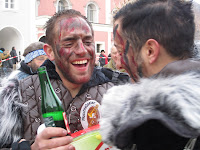Yesterday was Faschingsdienstag, the culmination of Fasching, as carnival is known in German-speaking Europe. It’s a season of silliness, costumes, music and noisemakers, and it’s unlike anything I’ve experienced in Ireland or in California.
 Fasching began for us in January, when I happened, by pure luck, to be in the centre of Salzburg to witness the start of a Fasching band festival. Bands from all over Austria, Switzerland, Italy and Germany, dressed in outlandish costumes, played on platzes around the city for two days.
Fasching began for us in January, when I happened, by pure luck, to be in the centre of Salzburg to witness the start of a Fasching band festival. Bands from all over Austria, Switzerland, Italy and Germany, dressed in outlandish costumes, played on platzes around the city for two days. They played marching band instruments, with percussion sometimes augmented by traditional wooden blocks and clappers. Performing on outdoor stages, they played popular songs and traditional songs and marching songs, including one song that was repeated by all the bands through the day. A kind of anthem, I assume it’s associated with Fasching.
Himself and I were there again the next day when, with a huge crowd watching, the bands assembled and played along side one another. An MC egged us all on, and the crowded linked arms and swayed in time with the anthems. When it ended, band members mingled, laughing and talking, eating and drinking beer. Sometimes they stood in groups playing on and on. Dusk was gathering when we followed the last of the bands as it marched away.
 Over the weeks since, I gathered what I could about Fasching from what was going on around me. Costumes and streamers of confetti were on sale in shops and grocery markets. Cases of sparkling wine were also prominently displayed. Several times on our way home from the city centre, we met people in costumes and painted faces waiting at bus stops. Last weekend we saw a brass band of about eight members playing on a bus as it pulled away. Just as the door closed, we heard the same Fasching anthem. I wanted to jump on the bus to hear them play it.
Over the weeks since, I gathered what I could about Fasching from what was going on around me. Costumes and streamers of confetti were on sale in shops and grocery markets. Cases of sparkling wine were also prominently displayed. Several times on our way home from the city centre, we met people in costumes and painted faces waiting at bus stops. Last weekend we saw a brass band of about eight members playing on a bus as it pulled away. Just as the door closed, we heard the same Fasching anthem. I wanted to jump on the bus to hear them play it.So yesterday, I bicycled into the Altstadt to see what I could of the last day of Fasching. It was a fine day warmed by a generous sun. Sandbars showed in the pale blue-green water of the Salzach, which is low right now. As I approached the city centre, there were dozens of people, many with bare legs and shoulders, lying on its steep grassy banks and playing on its sandy shore. A group of young people played a game that involved balancing bottles of beer in the sand then, at a signal, picking them up and drinking until someone shouted ‘Stop’.
I left my bike and simply walked, looking into shop windows and pausing now and again to read restaurant menus. I had heard that on Faschingsdienstag people wore costumes to work, so I was looking for as many costumes as I could find. Here and there were knots of children, sometimes shepherded by an adult, dressed up with painted faces. One group stood in narrow Linzergaße blowing noise makers nonstop. Another child of about five was dressed as a red devil. He looked up, wordless and unsmiling, at his father, who stood visiting with a friend.
Adults wore costumes too, the younger ones showing the most extravagant imaginations. Faces painted, dressed as pirates and oversized elves, as cowboys and sailors, in baby doll outfits and vamp clothes, they roamed the streets, arms over their companions’ shoulders, calling out to others and drinking beers. Sometimes there was no custom but bright coloured clothes, painted faces, wigs and outrageous hats. A waiter, dressed in the staid livery of the Hotel Sacher – the most expensive hotel in Salzburg – wore a bright orange fright wig as he served drinks on the hotel terrace.
When I had tired myself out walking, I turned to bike home again. Passing a bridge on my way, I stopped to see why a small crowd, some carrying placards, was milling about. A woman handed me a brochure and invited me to go to Rathausplatz. There was, she said, an exhibition celebrating the 100th anniversary of International Women’s Day.
Just then, a small band of women began playing jazzy-bluesy tunes while a news cameraman filmed them. One of the band, a big blonde woman in a bright violet jacket and matching violet glasses, played a terrific soprano sax. A young man in the crowd watching swayed and clapped as he watched.
I passed on the exhibition. The music and colour, laughter and sun, the women’s smiles as they played, had been enough for me.


